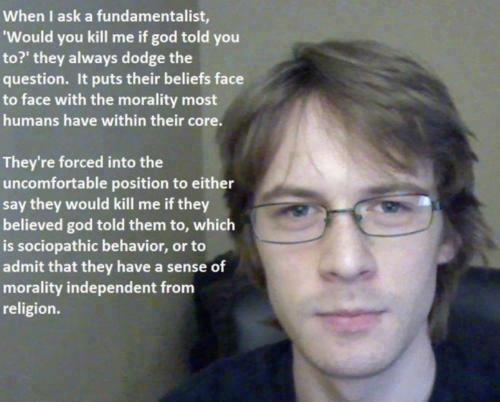When I ask a fundamentalist,
'Would you kill me if god told you to?'
they always dodge the question.
It puts their belief face to face with the morality most humans have within their core.
They're forced into the uncomfortable position of either say
they would kill me if they believed god told them to,
which is
sociopathic behavior, or to admit that
they have a sense of
morality independent from religion.
 http://www.facebook.com/photo.php?fbid=360566514009678http://www.facebook.com/secularvoice
http://www.facebook.com/photo.php?fbid=360566514009678http://www.facebook.com/secularvoiceAlex's comment:
Theism is a two-sided sword. By revering God as the Most High, all worldly seductions, such as money, power, and pride, are relativized. By revering God as the Most High, however, one thing that should not be relativized is also relativized--human life. That means theism opens the possibility and legitimacy to kill in the name of God. Unfortunately, killing in the name of God is not just a theoretical issue and are quite common in history. Recall the Inquisition and the Crusade, just to name two examples. This is the detrimental problem of theism. The only solution to prevent killing in the name of God is to place human life at the Most High, higher than God. And this, by removing God from the Most High, defeats and cancels theism.
有神論是兩刃的利劍。崇拜神為至高能相對化所有世俗的誘惑,包括名、利、權等等。然而,崇拜神為至高也相對化了一樣不應該被相對化的——人的生命。有神論意味著打開以神之名殺人的可能性和合法性。不幸的是,以神之名殺人不僅僅是一個理論上的問題,它在歷史上相當普遍地發生過。宗教裁判所和十字軍東征僅是其中兩個例子。這是有神論的死穴。要防止以神之名殺人的唯一解決辦法就是把人的生命奉為至高,比神更高。但這樣將神從至高位置拉下,便擊倒和取消了有神論。